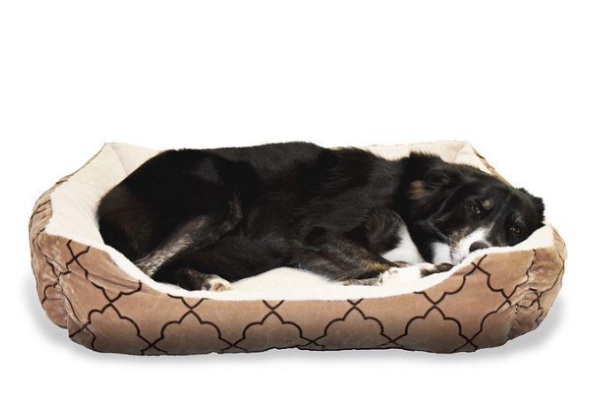9 Signs Of Border Collie Separation Anxiety (Causes & Prevention)

Border collie separation anxiety is a big problem for some owners who didn’t do good research before getting a border collie.
In this post, we will be looking at the causes of separation anxiety in border collies, signs, and how to prevent separation anxiety in a border collie.
Border collies are an active and energetic breed and are not for lazy people because this breed gets bored when left with nothing to do.
Let’s discuss border collie separation anxiety…
Border Collie Separation Anxiety
Border collie separation anxiety can be described as a behavioral problem or a panic state of mind developed due to the fear of being left alone or unattended to over a range of time.
This panic state of mind can lead to unnecessary destructive behaviors such as chewing valuables, nipping, barking, digging, and more.
If you remember that during your research about border collies you came across border collies bred to herd sheep.
This means border collies were selectively bred to be active dogs which you can’t just leave alone without any form of a task to perform.
Don’t get a border collie if you are not ready to fit into a border collie exercise and mental stimulation activities.
Let’s outline some common causes of separation anxiety in border collies before discussing signs and prevention.
Causes of border collies separation anxiety
Here are some common causes of separation anxiety in border collies:
- Continuous changing of daily routine.
- Leaving border collies unattended for too long.
- Traumatic experience.
- Lack of mental stimulation activities.
- Constantly changing of environment.
- Changing of the owner.
- Prolonged absence of the beloved owner.
- Inability to hear or weak vision.
- Constantly changing mealtimes.
- Poor socialization.
Check here to understand more about what causes separation anxiety in dogs.
Now you have a glance at circumstances that lead to border collie separation anxiety, let’s discuss some common signs to look out for.
Signs of border collie separation anxiety
The following are the most prevalent signs of border collie separation anxiety that owners should be aware of and evaluate:
1. Chewing things when left alone
You will be shocked by the damage done by a border collie suffering from separation anxiety if you leave them alone at home.
If Border Collies are separated from their owners for an extended period of time, they may scratch, chew, or destroy their belongings or toys.
When you get home, your dog may have eaten the table legs, doors, window sills, and door frames, as well as harmed the sofa or cushions.
Depression, stress, and loneliness are the most common causes of dangerous chewing, all of which can be precipitated by separation anxiety.
Chewing and digging in your home can result in injuries including broken teeth, scratches, nail or paw damage, and even furniture damage.
If you return home and see your stuff destroyed, don’t be mad at your pup because it is your fault for leaving them with much energy.
2. Increased barking behavior
Most border collies with separation anxiety may bark ceaselessly out of fear, aggravation, stress, tension, and loneliness, which can be a nuisance for both you and your neighbors.
Separation anxiety in border collies can grow over time or occur just minutes after the owner departs.
Because they are terrified of being alone, Border Collies with separation anxiety may bark excessively when their owners go to work or somewhere else.
Therefore, if your border collie begins to bark substantially more than normal when you leave or come, you should be concerned.
3. Scratching of walls or doors
Border collies typically experience worry and sorrow when separated from their owners, which can lead to clawing at doors and walls.
You’ll notice your border collie scratching the exit door as you leave for work if he has separation anxiety.
Your border collie may also scratch at the walls, which is a symptom of nervousness brought on by being alone.
If you come home to find scratches on your walls or doors, your border collie’s separation anxiety is causing you pain.
4. Increased digging behavior
Separation anxiety is one of the most typical causes of your border collie digging up your yard, fence posts, bed, or basement.
When they are bored or have nothing else to do, they dig to keep themselves occupied and away from boredom or loneliness.
You must take action if you return home to find your border collie digging in your yard, basement, bed, or fence base due to separation anxiety.
That’s a clear indication that your border collie is bored, and ignoring it will only make things worse.
5. Increased whining behavior
If your border collie is angry, worried, or has separation anxiety, he may whimper at any moment.
If the stressor is something your border collie can’t escape, whining is nearly often followed by pacing.
If your border collie isn’t howling because he has to go outdoors or is in pain, it’s most likely stress.
When dogs are distressed by separation anxiety, they may lose control of their natural whining.
It is, however, an indication that something is amiss in your border collie’s environment.
Anxiety in dogs can present itself in a number of ways, including whining.
6. Increased clingy behavior
Increased clingy behavior usually occur when you are about to leave or when you return home.
When your border collie is afraid of being alone, he will do all he can to get out of the home and locate you.
In an attempt to urge him to go because he is terrified of being alone, your border collie may injure himself by banging his head and teeth against the cage bars.
If your border collie attempts to flee the house whenever you leave, don’t ignore it; it might lead to unwanted behavior.
This is a serious problem since it means your border collie is terrified of being alone, which can cause separation anxiety.
7. Increased self-isolation
Border collies can isolate themselves for a variety of reasons, the most common of which being separation anxiety and fear.
When a border collie is scared, he may seek refuge in a little chamber or in a piece of the owner’s clothes that smells like him.
Your border collie may curl up beneath the table or elsewhere in the house to hide.
If your border collie begins to hide needlessly, don’t ignore it; instead, attempt to figure out why.
In a border collie, this is one of the most obvious indicators of separation anxiety.
8. Unnecessary freezing
Because he is scared of being alone, your border collie freezes or gets rigid when you return home from work or leave.
Freezing your border collie all of the time can be hazardous to both you and your dog, since it can lead to behavioral issues such as biting.
If your border collie continues to freeze as you walk away, it means he’s worried and won’t be able to handle the situation, which might end in a bite.
Border collies with separation anxiety are known to freeze unnecessarily when their owners leave or return, which is a clear indication of separation anxiety.
9. Frequent house accidents
Assume your border collie is completely housebroken but still has accidents when you leave and come back.
This is a clear indication that your border collie is concerned about you while you’re gone, and if nothing is done about it, things will only become worse.
If your puppy or adult border collie becomes frightened and starts eating his or her own excrement, keep an eye on him or her.
Regardless of how unpleasant this symptom is, you may take steps to avoid it or just fix the underlying illness that is causing you anxiety.
How to prevent separation anxiety in border collies
The most common and advised strategies for coping with separation anxiety in border are as follows:
1. Start a concise crate training
Separation anxiety can be helped by effective crate training sessions over time.
Crate training is a common puppy training method for a multitude of concerns, including separation anxiety.
When you’re gone for a lengthy amount of time, crate training may provide a safe and calm environment for your border collie.
The objective is for the border to link exciting items like chew toys and food-releasing puzzle games to his kennel, encouraging him to visit.
Border collies may feel safer and more at peace when left alone, so watch your puppy’s behavior to see whether his anxiety symptoms lessen or worsen.
2. Avoid all exit signals
All leave signals should be avoided, such as picking up your keys, because they may induce separation anxiety in border collies.
When you leave for the day or return, don’t make a big deal about it. Avoid touching, conversing, or making eye contact throughout your exit.
Many dog trainers believe that when you go home, you should start educating your dog that being away isn’t that bad.
You may need to exercise the rule for five minutes or up to an hour before leaving and returning, depending on the intensity of the dog’s fear.
3. Spend time with your border collie
Your border collie’s brain stays active through exposing it to a variety of stimuli, releasing energy, and socializing with other canines or people.
Participate in sports with your border collie if they are naturally eager, like as agility training.
You’ll deepen your bonds while also improving your own and your loved ones’ health.
While you’re away, play a game of treasure hunt with your border collie.
You might buy a large bag of goodies and bury them throughout your dog’s area; this will keep your border collie occupied and alert all day.
Again, moderation is essential, since too many treats may be harmful.
Schedule time to play fetch with your border collie to help with separation anxiety.
4. Set up a window view
Providing a clean window view of the outside world for your border collie might help keep him interested while you go about your business.
Set up a little step for your border collie to climb up to the window and look out, especially if you live in a busy area during the day.
To accomplish so, you’ll need to properly socialize your border collie and make the window conveniently accessible.
5. Provide a safe and calming spot
Every border collie feels safe in their own space, which is why most unsocialized dogs refuse to let other people or pets into their room or bed.
Establish a reference point where your dog associates the environment as tranquil and nice to help him cope with separation anxiety.
Ensure that the border collie gets everything he requires at the reference site, such as a chew toy or calming music, so that he can quickly know it as a safe location.
You can periodically accompany your dog to the region, but you should never force the border collie out of his safe zone; instead, let the border collie to emerge on its own terms.
6. Stick to a daily schedule
Your border collie will be more calm since he will always know what to anticipate. Keep them engaged and busy at all times.
Because he will be active for the majority of the day, your border collie will never be bored or notice your absence.
Make a daily plan that works for both you and your border collie, and delegate as much as you can.
When it’s time to eat, don’t put off practicing until your border collie is comfortable.
If you and your border collie develop a timetable that works for both of you, the bulk of your problems will be solved.
7. Turn on your TV or radio on before leaving
Another common way for preventing border collie separation anxiety is to train them to associate peace with watching TV or dog shows.
To help your dog relax and watch while you’re gone, show them a range of dog shows.
Get as many dog movies as you can and let your border collie choose which ones will keep them engaged and quiet.
While you’re doing something else, teach your border collie to sit and watch dog programs on TV.
Therefore, your border collie will enjoy exciting dog shows while you are gone and remain calm.
8. Bring in a companion pet
Dogs are pack animals who flourish when they are surrounded by other members of their family.
Because they were meticulously developed to be a human companion and thrive largely on human companionship, most dogs are prone to separation anxiety.
If you are not always available, having a companion pet as soon as possible is one of the best, if not the best, techniques to reduce separation anxiety in dogs.
Your dog will be less likely to have separation anxiety if you have a companion animal.
To avoid separation anxiety, get your dog a companion pet. If you buy another pet or dog, your dog will always have someone to play with.
9. Tired out your border collie before leaving
Take your border collie for a long work or play the fetch game to drain your border collie energy before you leave.
Border collies are active dogs with lots of energy and would need constant exercise to stay fit.
Make sure you give your border collie enough exercise as this will help them relax and take a long nap.
I hope with the information provided on this page your concerns about border collie separation anxiety were resolved!






